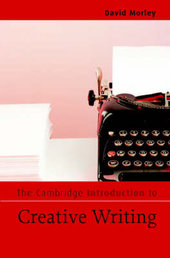
|
The Cambridge Introduction to Creative Writing
Hardback
Main Details
| Title |
The Cambridge Introduction to Creative Writing
|
| Authors and Contributors |
By (author) David Morley
|
| Series | Cambridge Introductions to Literature |
|---|
| Physical Properties |
| Format:Hardback | | Pages:290 | | Dimensions(mm): Height 235,Width 155 |
|
| Category/Genre | Creative writing and creative writing guides |
|---|
| ISBN/Barcode |
9780521838801
|
| Classifications | Dewey:808.042 |
|---|
| Audience | | Tertiary Education (US: College) | | Professional & Vocational | |
|---|
| Illustrations |
12 Halftones, unspecified
|
|
Publishing Details |
| Publisher |
Cambridge University Press
|
| Imprint |
Cambridge University Press
|
| Publication Date |
10 May 2007 |
| Publication Country |
United Kingdom
|
Description
This pioneering book introduces students to the practice and art of creative writing and creative reading. It offers a fresh, distinctive and beautifully written synthesis of the discipline. David Morley discusses where creative writing comes from, the various forms and camouflages it has taken, and why we teach and learn the arts of fiction, poetry and creative nonfiction. He looks at creative writing in performance; as public art, as visual art, as e-literature and as an act of community. As a leading poet, critic and award-winning teacher of the subject, Morley finds new engagements for creative writing in the creative academy and within science. Accessible, entertaining and groundbreaking, The Cambridge Introduction to Creative Writing is not only a useful textbook for students and teachers of writing, but also an inspiring read in its own right. Aspiring authors and teachers of writing will find much to discover and enjoy.
Author Biography
David Morley is Senior Lecturer in English and Director of the Warwick Writing Programme at the University of Warwick.
Reviews'No writer-teacher is better qualified than David Morley to lift the veils on the discipline of Creative Writing. He writes with all his feelings and a richness of metaphor that is beguiling for the general reader, the general writer, and the teacher. The exercises are inspired, growing out of the author's profound understanding of the inviolable connection between good writing and good and various reading. This book will be an inspiration and tool for teachers and writers who, like Morley, understand that the development of writing involves aquiring skills, and that inborn genius benefits from training and understanding.' Professor Michael Schmidt, Professor of Poetry, University of Glasgow
|